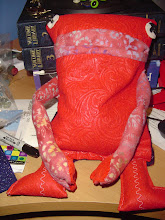What is a Muse?
muse (v.)
"to be absorbed in thought," mid-14c., from O.Fr. muser (12c.) "to ponder, loiter, waste time," lit. "to stand with one's nose in the air" (or, possibly, "to sniff about" like a dog who has lost the scent), from muse "muzzle," from Gallo-Romance *musa "snout," of unknown origin. Probably influenced in sense by muse (n.). Related: Mused; musing.
muse (n.)
late 14c., protectors of the arts, from L. Musa, from Gk. Mousa, lit. "muse, music, song," from PIE root *mon-/*men-/*mn- "to think, remember" (see mind (n.)). The names of the nine Muses, daughters of Zeus and Mnemosyne (q.v.), and their specialties are traditionally: Calliope (epic poetry), Clio (history), Erato (love poetry, lyric art), Euterpe (music, especially flute), Melpomene (tragedy), Polymnia (hymns), Terpsichore (dance), Thalia (comedy), Urania (astronomy).
Friday, January 8, 2010
Subscribe to:
Post Comments (Atom)































No comments:
Post a Comment